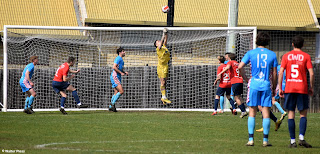Photo: The DVD of the 1960 FA Cup Final.
Kevin Clamp, who played with Metro some decades ago and whose son Jacob now plays for New Town White Eagles, gave me a DVD earlier this season of the 1960 FA Cup Final between Wolverhampton Wanderers and Blackburn Rovers.
Kevin’s uncle, Eddie Clamp, played for Wolves in that 1960 Cup Final.
Now that the season is over, I finally found the time to watch the DVD and I am so glad I did.
It was a window into how society and the game have changed over the past 63 years.
The game was played at Wembley Stadium in London on a scorching day.
Readers may have heard of “The White Horse FA Cup Final” of 1923 between West Ham United and Bolton Wanderers at the brand-new Wembley Stadium.
It was known as that because at 3pm, the time of the scheduled kick-off, there were 10,000 fans on the Wembley pitch.
The stands were packed and these 10,000 fans had spilled onto the pitch and a lone policeman mounted on a white horse was trying to clear them from the pitch.
The official attendance was 127,047 but it is estimated that 200,000 were in the ground, hence the overspill.
The “White Horse Bridge’ at the new Wembley is named after that occasion.
The 1960 Cup Final was called the ‘white shirt’ final by some commentators because the day was so hot that most of the spectators had taken off their jackets and the stadium was a sea of white shirts. Most were also wearing ties.
The 1960 Cup Final was not a great game (Wolves won 3-0), but there were many points of interest for me.
The fairness and sporting behaviour of the players was the first thing I noticed.
I was surprised to see that one goalkeeper, when he deflected the ball out for a corner, went and retrieved the ball and delivered it to the player from the opposing team who was going to take the corner.
You’d never see that today.
And, the ball was placed inside the quadrant for the corner. Today, players taking a corner have it barely touching the line markings of the quadrant and one could mount an argument that today’s trend verges on the illegal.
Twenty or so photographers sat on the grass on either side of the two goals and very close to the posts. That would never be allowed today.
Just before half-time, a Blackburn player suffered a broken leg. He was lying injured just outside his own penalty area.
As the ambulance officers were treating him on the pitch and putting him on a stretcher, a dozen or so of the photographers came onto the pitch and close to the injured player and started photographing. Can you imagine that happening today?
Never. Besides, today’s long lenses and better equipment would make it unnecessary. I found it very surprising that they were allowed onto the field of play.
And, there were no substitutes at that time. The injured player could not be replaced and so Blackburn had to play more than one half with only 10 players.
The commentator was the famous Kenneth Wolstenholme and he did the commentary alone.
There were none of the big brand names in boots, nor the multi-coloured boots of today. Everyone wore drab black or brown leather boots.
The football was a plain old brown one, with a lace. And it was the only ball used. There were not three or four others lying about which could be used as a replacement when the ball went out of play.
The linesmen were of interest, too. If the ball went out near them they would stop it and serve it back to the thrower. Today’s assistant referees never field the ball when it goes out of play. They never touch it.
And, at corners, the linesman would take up a position between the corner flag and the near post. Today, they stand at the corner flag.
Another interesting feature was that in the first half the linesman controlled the right wings. In the second half, they did the left wings.
I’d be interested to hear from one of today’s referees and learn when that practice changed.
In conclusion, I told Kevin an anecdote about his uncle, Eddie, who earned four England caps during his career and played for England at a World Cup. Incidentally, he played for Arsenal and Stoke City as well as for Wolves, with whom he won two league titles.
He was nicknamed ‘Chopper Eddie’ because he took no prisoners.
While playing for Stoke, his team-mate, the famous Stanley Matthews, was butchered in one game by Chelsea’s ‘Chopper’ Harris.
Clamp complained to the referee, who told him to go away.
Clamp responded with a quote that has gone down in football folklore.
“That’s the trouble with you referees,” Clamp said. “You don’t care which side wins.”
Photo: The back cover of the DVD.
.jpg)
.jpg)



.JPG)
.JPG)




.JPG)




